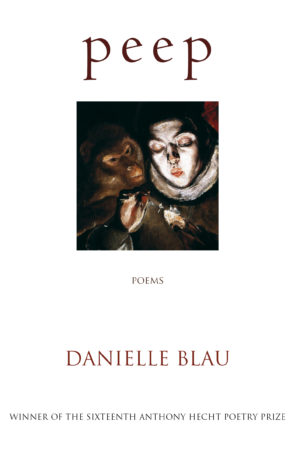peep
by Danielle Blau
reviewed by Josh Brewer
We expect great things from winners of the Anthony Hecht Poetry Prize. Danielle Blau’s peep—also named to Lambda Literary’s Most Anticipated LGBTQIA+ Literature list, another bellwether of high-quality books—meets and exceeds those expectations. Blau is a trained philosopher, but these poems are not abstract, tidy thought-puzzles. In peep, Blau uses palindromes as a tenet of poetic structure and even meaning, returning to the titular palindrome in the collection’s penultimate stanza and suggesting that the volume itself is a poem.
The book’s palindromic structure demands that each poem be read forwards and backwards. The best poems send us from the last line back to the first in search of a reflective structure, or a kind of volta or turn in the middle—an end that is a beginning. Blau’s poems almost seem recondite by design. Like a game of three-card monte, their simple setup tempts us to peep beneath the sleight of hand—and when we do look, the hidden card’s location bewilders us.
Blau’s book is full of theoretically informed structures. For example, in the lists of the prose poem “Formal Proof That the Universe is Neither Cruel nor Kind, and That This Is the Greatest Conceivable Horror,” a pattern emerges. Blau oscillates between the abstract and the concrete. Lines begin with philosophically ambitious concepts like the “laws of motion” before plunging into the particular (“miniature jam jars,” a “darkly dilating ripple”).
Another prose poem, “We’re Human, All of Us Girls, and We’re Young,” alludes to the infamous Triangle Shirtwaist Factory fire: specifically, the title comes from a Yiddish-speaking garment worker, who organized her fellow workers in the wake of the conflagration. Blau’s depictions evoke the Holocaust, the shoes and eyeglasses that may still be found at Auschwitz: “The girls who were too burnt were identified by buttons on their cuffs, heels on their shoes, darns in their stockings, braids in their hair, caps on their teeth.” In another poem of disaster, “A Suicide Bomber (Eighteen Seconds to Go) Foresees Her Death,” Blau evokes the complex humanity of Shakespeare’s Shylock:
a girl’s sudden
round cheeks—exactly like here
but, up there, when youprick them they bleed.
Blau’s verse is clear-eyed, attentive to craft, and often wild. Although the author is Jewish and queer, these poems can hardly be called confessional, even when they employ the personal pronoun. Instead of lurid details, the personae we find here speak sotto voce, embodiments of innocence and experience. We find this uncertainty of being in the poems and also between the lines.
Sometimes, the first person can body forth a kind of “they,” as in the poem “The Fear,” a long and skittery list poem (of sorts) whose speaker sees that “there’s another me / inside of me // and she is wearing Hedi Slimane” (the name of a man bullied for his “queer looks”). Such disappearing acts pervade the book. The quick shifts from profundity to frivolity reappear later in the stanza, when the speaker dons mortality: “Me, I’ll just go in this / fyi, borrowed / likeness of shrunk death.” On the next page, we hop and skip from eating to planting to dying: “I meant / to get clementines. I count all my / seeds after dark. My chair is a Casket.” The same poem employs a palindromic structure, lending a shape to fear itself.
I found a
hole
that had amirror in it
and that
mirrorlooked in at
a mirror
inme that
had a
hole in it
These inversions show how a poet can rend a solid structure, or even a human being, asunder; how a mirror’s reflection is not a metaphor for wholeness, but for absence, loss, and open endings.
Published on September 1, 2022

